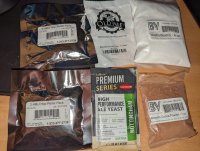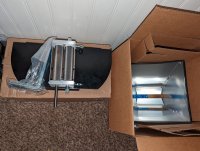I am going to brew the below stout in the next 1-2 weeks and am looking to make the best of it. My last 2 brews were decent but I was never excited about pouring a glass. I am going to try adjusting water chem to see if I can get an improvement with this batch. I can use distilled and add minerals as needed, but I've read that tap may be better for a stout. Can anyone help me out with what minerals to add and when? I will also have a ph tester.
Thank you
https://www.austinhomebrew.com/AHS-...ALL-GRAIN-Homebrew-Ingredient-Kit_p_1501.html9 lb Pale Malt
12 oz Chocolate Malt
8 oz English Crystal Malt
8 oz Flaked Oats
2 oz Black Patent Malt
2 oz Roasted Barley Malt
I will also add 0.75-1# of lactose at 10 minutes and toasted coconut flavoring at kegging
Thank you
https://www.austinhomebrew.com/AHS-...ALL-GRAIN-Homebrew-Ingredient-Kit_p_1501.html9 lb Pale Malt
12 oz Chocolate Malt
8 oz English Crystal Malt
8 oz Flaked Oats
2 oz Black Patent Malt
2 oz Roasted Barley Malt
I will also add 0.75-1# of lactose at 10 minutes and toasted coconut flavoring at kegging
Last edited:











![Craft A Brew - Safale S-04 Dry Yeast - Fermentis - English Ale Dry Yeast - For English and American Ales and Hard Apple Ciders - Ingredients for Home Brewing - Beer Making Supplies - [1 Pack]](https://m.media-amazon.com/images/I/41fVGNh6JfL._SL500_.jpg)
















































